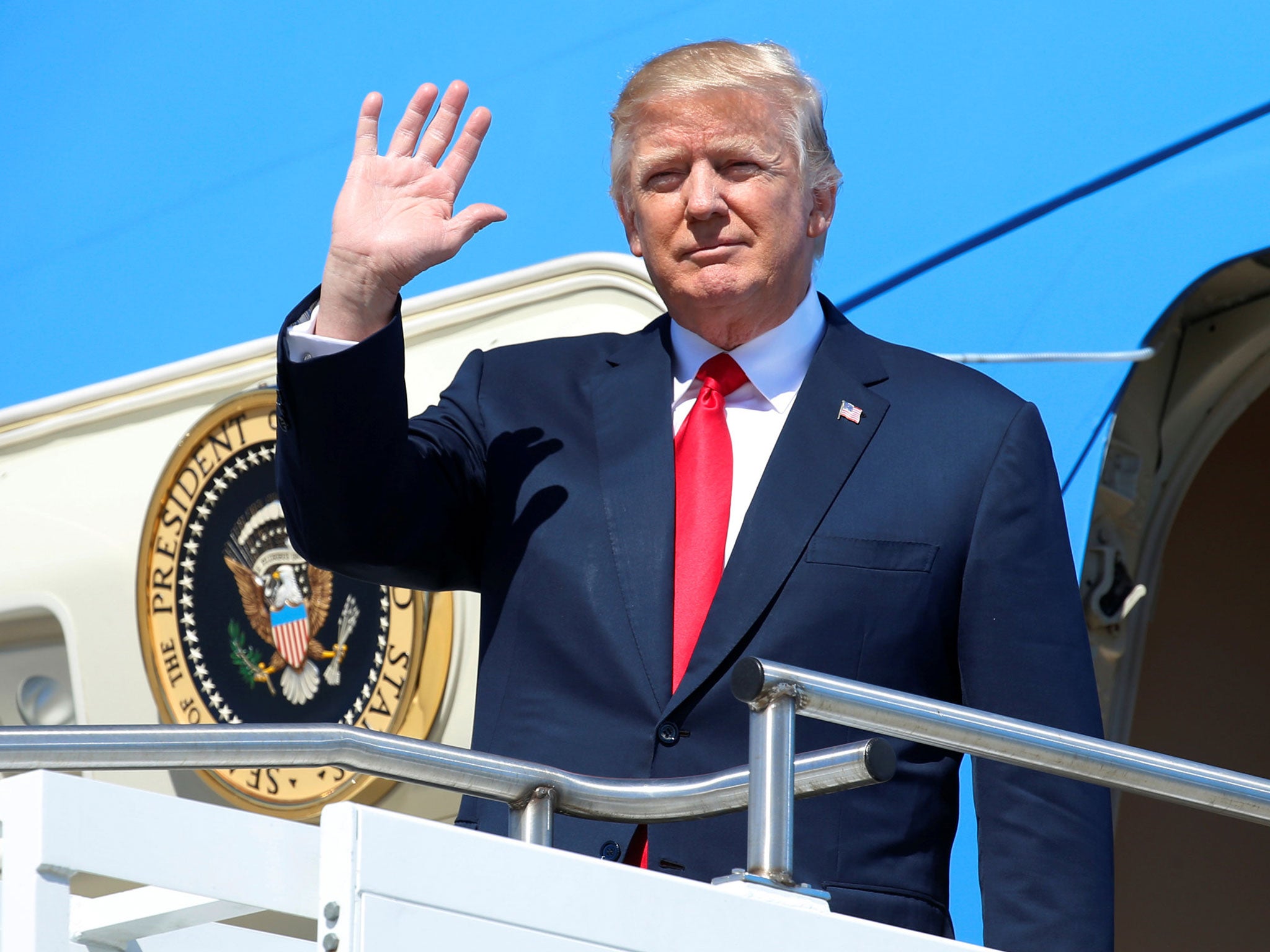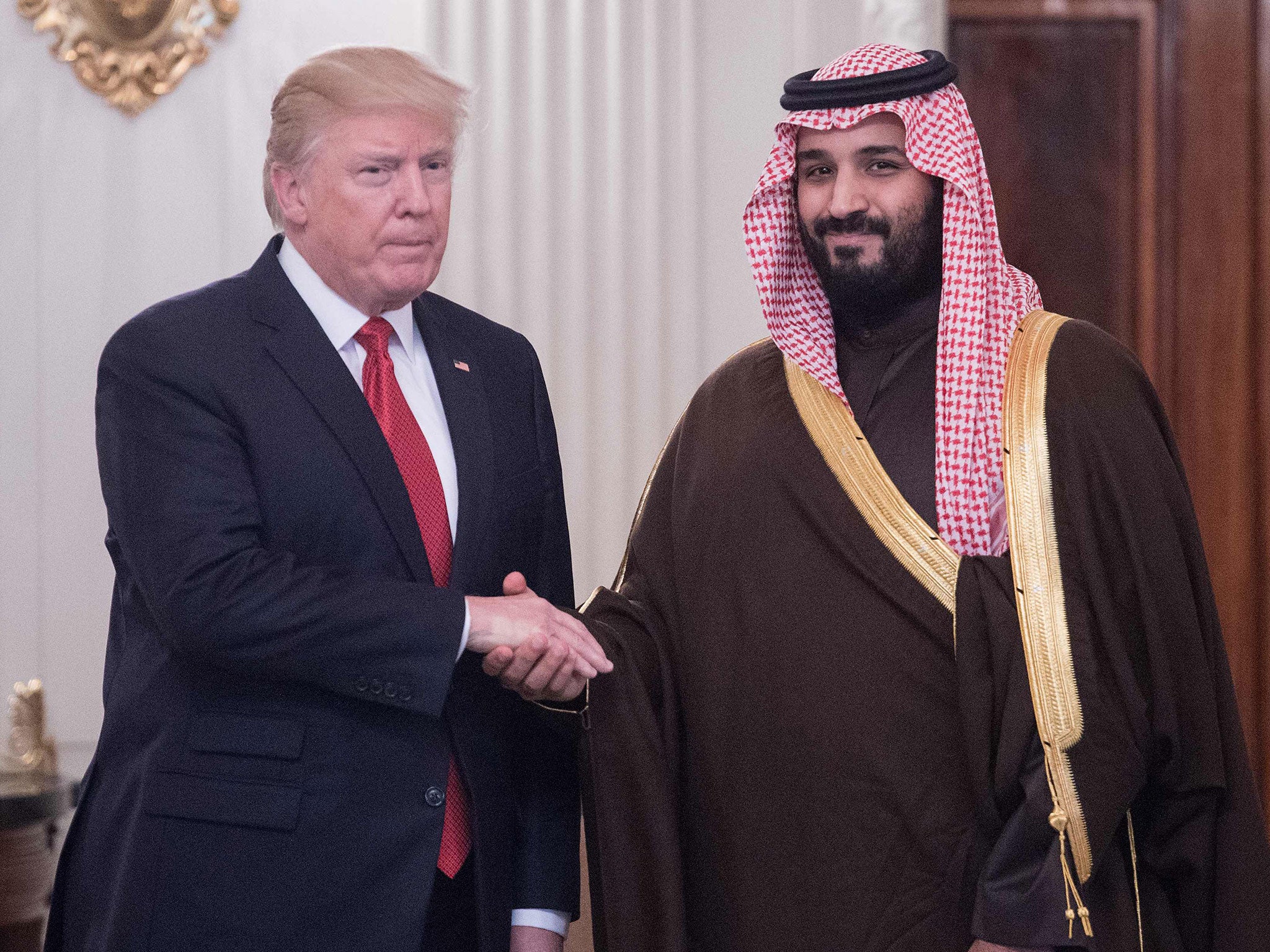Donald Trump heads to Saudi Arabia on inaugural foreign tour with Washington scandals in his wake
President could encounter new controversy with stops in Israel, Belgium and Italy

Donald Trump is heading to Saudi Arabia on the first stop of his inaugural foreign tour amid swirling controversy over his firing of former FBI director James Comey and alleged links with Russia.
The President will be hoping to leave allegations he pressed Mr Comey to drop a probe into his former national security adviser at home, along with claims he passed intelligence to Russian officials as a special counsel takes over investigations into possible meddling by Moscow.
“We look forward to getting this whole situation behind us,” Mr Trump told a White House news conference before setting off.
But he will have to tread carefully on a nine-day tour taking in countries including Israel, Belgium and Italy, encompassing visits to holy sites from the world’s three major religions.
Despite numerous controversies over Mr Trump’s comments about Muslims and attempted immigration bans, he is expected to receive a warm welcoming from leaders in Riyadh.
Having repeatedly condemned Saudi Arabia during his election campaign, the President has made no move to row back the US’ friendly relationship with the Sunni Muslim autocracy.

Last year, Mr Trump slammed the country as a “money machine” that did not “reimburse” the US for its support, then used a presidential debate to attack Hillary Clinton’s acceptance of funding from Saudis, who he described as “people that push gays off buildings [and] kill women”.
Despite the fact 15 of al-Qaeda’s 9/11 attackers came from Saudi Arabia, the country was conspicuously absent from a list of Muslim-majority countries whose citizens were briefly barred from the US under a failed ban supposedly sparked by terror risks.
Mr Trump has himself insinuated the Saudi government was behind the world’s deadliest terror attack, telling Fox News in February 2016: “Who blew up the World Trade Center? It wasn’t the Iraqis, it was Saudi - take a look at Saudi Arabia, open the documents.”
Saudi Arabia has been accused of fuelling Islamist extremism with its adherence to fundamentalist Wahhabism and funding foreign mosques and schools that spread the ideology, sparking criticism from German intelligence services in a recent report.
All past grievances appear to be forgotten since the President took office, welcoming Saudi leaders for a cordial visit to the White House in March.
It saw deputy crown prince Mohammad bin Salman hail Mr Trump as a “true friend of Muslims” and launch a defence of the attempted travel ban, claiming it targeted “terrorists” rather than the religion of Islam itself.

“President Trump expressed his deep respect for the religion of Islam, considering it one of the divine religions that came with great human principles kidnapped by radical groups,” a spokesperson said.
“President Trump has an unprecedented and serious intention to work with the Muslim world and to achieve its interests and Prince Mohammed considers his Excellency as a true friend of Muslims.”
Mr Trump will outline his views of Islam in a speech to Saudi leaders, which intends to “unite the broader Muslim world against common enemies of all civilisation”.
The President’s national security adviser, HR McMaster, said he “will deliver an inspiring but direct speech on the need to confront radical ideology and the President’s hopes for a peaceful vision of Islam to dominate across the world”.
Growing ties with Saudi Arabia, which follows Sunni Islam as a state religion, are likely to anger the Shia Muslim world – particularly Riyadh’s enemy Iran.
Mr Trump has frequently targeted the country while opposing the landmark nuclear deal struck in 2015, claiming to put Tehran “on notice” following a ballistic missile test in February, with Ayatollah Ali Khamenei responding by calling nationwide protests, where anti-US demonstrators burned flags and shouted “death to America”.
Despite friendly meetings with Benjamin Netanyahu during his visit to Washington, there could also be trouble awaiting the President in Israel, which is reported to be the source of intelligence on Isis shared with Russia.
Mr McMaster added to the outrage by refusing to declare the Western Wall a part of Israel, in line with long-standing US policy on East Jerusalem and the Occupied Palestinian Territories, although his position was reversed by US ambassador Nikki Haley.
Mr Trump’s views on the Iran nuclear deal – which is now under a US government review – could cause tensions during the European portion of the visit.
Questions also linger over Mr Trump’s commitment to Nato, security and scepticism of the Paris climate agreement.
In Rome, the Mr Trump will call upon Pope Francis in the Vatican, despite calling the holiest man in the Catholic faith “disgraceful” for questioning his faith in critical comments made during his campaign.
In Brussels, Mr Trump will attend a meeting of Nato, after repeatedly musing about abandoning the “obsolete” military alliance over financial commitments, and in Sicily, the president will meet with the other leaders of the G7.
Among the critics awaiting him is Emmanuel Macron, the new French President who vowed to take the President to task on climate change after Mr Trump endorsed far-right candidate Marine Le Pen.
Join our commenting forum
Join thought-provoking conversations, follow other Independent readers and see their replies
Comments
Bookmark popover
Removed from bookmarks